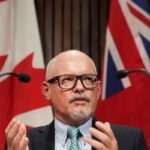In an unprecedented move that has sent ripples through British Columbia’s healthcare landscape, Island Health has eliminated several executive positions, including a vice president role, citing mounting financial pressures that have strained the health authority’s operational budget. The decision, confirmed Thursday, marks one of the most significant administrative restructurings in the organization’s recent history.
“We have made the difficult decision to reduce our executive team structure,” said Island Health President and CEO Kathy MacNeil in a statement obtained by CO24. “These changes are necessary to meet our financial obligations while ensuring we maintain our focus on providing quality care to Vancouver Island residents.”
The restructuring eliminates the position of Vice President of Clinical Operations for Central and North Island, previously held by Dermot Kelly, along with several other executive roles. Sources within the organization indicate that affected executives were notified earlier this week, with the changes taking immediate effect.
Financial documents reviewed by CO24 News reveal that Island Health has been grappling with a budget deficit of approximately $22 million for the current fiscal year. This shortfall comes despite receiving a funding increase from the provincial government, highlighting the growing cost pressures facing healthcare systems across Canada.
Health policy analyst Dr. Eleanor Richards points to several factors contributing to the financial strain: “We’re seeing a perfect storm of rising pharmaceutical costs, aging infrastructure, population growth on Vancouver Island, and the lingering impacts of pandemic-related healthcare backlogs.”
The B.C. Ministry of Health confirmed awareness of Island Health’s decision but emphasized that front-line services would not be affected. “Our priority remains ensuring British Columbians receive the care they need,” said Ministry spokesperson David Thompson. “Administrative restructuring is within the authority of health regions to manage their operations effectively.”
Healthcare unions have expressed concern about the potential downstream effects. “While these cuts target executive positions, we’re watching carefully to ensure this doesn’t signal broader reductions that could impact patient care or frontline staffing,” said Maria Lopez, representative for the Hospital Employees’ Union.
The layoffs at Island Health parallel similar moves across Canadian healthcare systems. Alberta Health Services reduced its management positions by 5% last year, while Ontario hospitals have been directed to find administrative efficiencies amid provincial budget constraints.
Industry observers note that Island Health’s executive compensation had previously drawn scrutiny. Public sector salary disclosures show that several executives earned between $250,000 and $350,000 annually, placing them among the highest-paid public servants in the region.
Island Health serves approximately 850,000 people across Vancouver Island and adjacent coastal communities through 150 facilities, including hospitals, health centers, and long-term care homes. The authority employs over 22,000 staff and 1,900 physicians.
As healthcare systems nationwide navigate post-pandemic recovery amid inflation and demographic pressures, the question remains: Will other health authorities follow Island Health’s lead in trimming executive ranks, and what will be the long-term implications for healthcare administration and delivery in an increasingly resource-constrained environment?
























